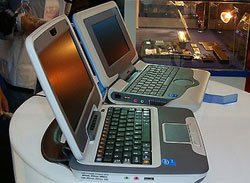After netbooks are net-top
Some computer makers said the next few months will market computers with the name 'net-top,' a low-cost version of the desktop with the main purpose of going to the Internet.
CherryPal, a leader in this area of Silicon Valley, said it would bet with the net-top by offering a $ 240 model, paper-size and 2 watts of energy. with 100 watts of some other desktops.
The company wants to take advantage of the 'cloud computing' trend that allows data to be managed and stored on remote servers instead of on-premises.
In the face of netbooks in recent times, Dell and Acer have not let their predecessors dominate this new market. Hewlett-Packard has also recently started shyly entering this market with a netbook notebook notebook called a Mini-Note.
The market will reach 40 million units / year
The success of Asus with the $ 300 Eee PC has surpassed the industry's hardware and software industry with 350,000 units sold worldwide. Asus's original goal was to target the education market or just an adult laptop for the first time using a computer. However, demand has gone beyond that range.
 According to Jackie Hsu, president of the American distribution segment of Asus, this type of computer was later scarce. Everex has sold about 20,000 CloudBook computers for $ 350 each.
According to Jackie Hsu, president of the American distribution segment of Asus, this type of computer was later scarce. Everex has sold about 20,000 CloudBook computers for $ 350 each.
This amount is small compared to 271 million desktops and laptops sold last year globally. But the reality shows that there has been a fierce debate about how far this computer array will continue to grow and who really cares about those computers.
Market research firm IDC predicts that the netbook market will increase from 500,000 in 2007 to 9 million in 2012, when the second computer market starts higher than in developed countries.
Intel also predicts that by 2011, the netbook computer market will reach 40 million per year, which is why Intel will jump into the low-power Atom chip market for netbook and net-top use. . Currently, Intel is competing with Via, a Taiwanese company that makes C7 chips for netbooks as well as in the Everex and HP Mini-Note for $ 500.
William Calder, an Intel spokesman, said the cost of an Atom chip was about $ 44, compared with $ 100 for a modern chip. He said Intel executives thought the cheap PC market was too big and hard to ignore, although it was also a threat to more powerful and more profitable computers.
Microsoft used to be very cautious when it came to the market, but the company said it could make exceptions despite no longer selling Windows XP. Because Microsoft does not want to lose market share to rival Linux.